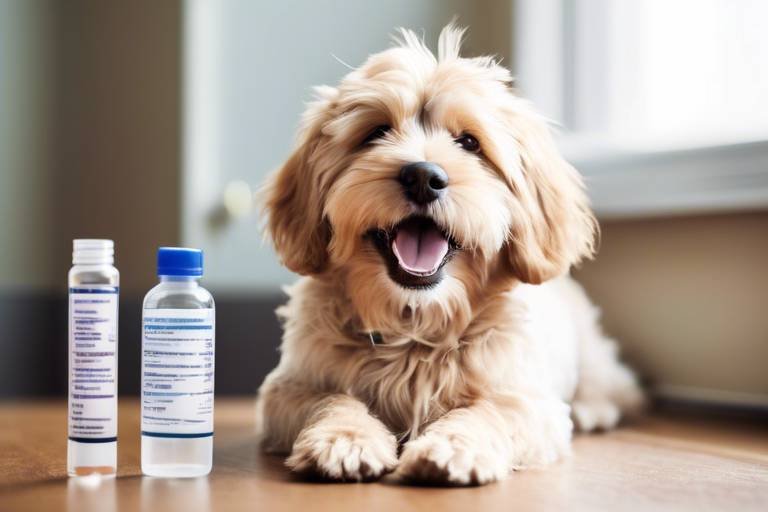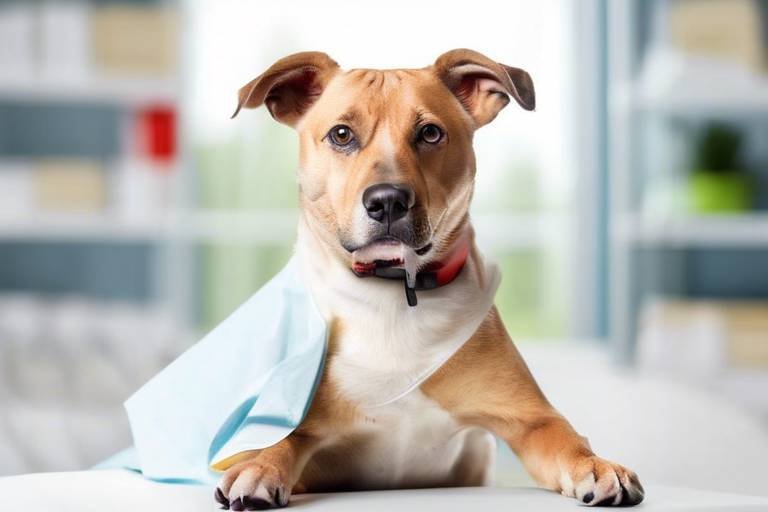How to Choose the Right Veterinarian
Choosing the right veterinarian for your furry friend can feel like a daunting task, but it doesn’t have to be! Just like you wouldn’t trust your health to just anyone, your pet deserves the same level of care and attention. After all, they are part of the family! A good veterinarian not only provides medical care but also becomes a trusted partner in your pet's health journey. So, how do you find the perfect match? Let’s dive into some essential tips that will guide you in making an informed decision that ensures a long-lasting and trusting relationship for optimal care and support.
When it comes to your pet's health, knowledge is power. Understanding a veterinarian's qualifications and experience is crucial for ensuring your pet receives the best care possible. Start by looking for their credentials, such as a Doctor of Veterinary Medicine (DVM) degree, and check if they are certified by a recognized veterinary board. But don't stop there! Consider their specializations and years of practice as well. For instance, some vets may focus on specific areas like dental care, surgery, or even exotic animals. This can make a huge difference in the quality of care your pet receives. Remember, a well-rounded vet with extensive experience can often spot potential health issues before they become serious. So, ask about their background and any additional training they've undergone!
The quality of a veterinary clinic's facilities can significantly impact your pet's health. When you walk into a clinic, take a moment to observe the cleanliness and organization of the space. A tidy environment reflects the clinic's commitment to hygiene and care. Additionally, inquire about the equipment they use. Are they up-to-date with the latest technology? This can be crucial for accurate diagnostics and effective treatment. Don’t hesitate to ask about the range of services offered, as some clinics provide specialized care, such as dermatology or behavioral therapy, which might be beneficial for your pet. Remember, a well-equipped clinic can make all the difference when it comes to your pet’s health.
Emergencies can happen at any time, and knowing how your veterinarian handles urgent situations is vital. It’s essential to know if the clinic offers emergency services or has partnerships with nearby facilities. This ensures your pet receives timely care when it matters most. Ask about their emergency protocols and whether they have a dedicated team available after hours. You wouldn't want to be left in a lurch during a crisis, right? A clinic that prioritizes emergency care can provide you with peace of mind, knowing that help is just a phone call away.
Inquire about after-hours care options, as emergencies can strike at the most inconvenient times. Understanding the clinic's protocol for after-hours assistance can provide you with reassurance. Some clinics might have a vet on call or can refer you to an emergency animal hospital. It’s always better to be prepared and know your options before an emergency arises. This way, you can focus on what truly matters: your pet's well-being.
A good veterinarian should have a reliable referral network for specialized care. In the event that your pet requires advanced treatments or consultations, having a vet who knows the best specialists can save you time and stress. Ask your potential veterinarian about their referral process and whether they have trusted colleagues in specialized fields. This network can be invaluable when it comes to ensuring your pet receives comprehensive care.
Effective communication between you and your veterinarian is vital for a successful partnership. After all, you want to feel comfortable discussing your pet’s health, right? Assess how well the veterinarian listens to your concerns, explains treatment options, and addresses your questions. A good vet will take the time to ensure you understand the diagnosis and the recommended course of action. If you feel rushed or dismissed, it might be time to look elsewhere. Remember, a strong communication style fosters a positive relationship, allowing you to work together for your pet’s health.
Every veterinarian has a unique approach to treatment, and understanding their philosophy can help align your expectations for your pet's health. Some vets may focus heavily on preventive care, while others might be more inclined to explore alternative treatments. Knowing where they stand can help you make a more informed decision. For instance, if you believe in the importance of vaccinations and regular wellness exams, you’ll want to find a vet who shares that philosophy.
A veterinarian who emphasizes preventive care can help maintain your pet's health over time. Discuss their approach to vaccinations, nutrition, and wellness exams. A proactive approach can lead to early detection of health issues, which is often the key to successful treatment. Ask about their recommended vaccination schedule and how they tailor it to your pet’s lifestyle. Remember, prevention is always better than cure!
If you're interested in holistic or alternative therapies, inquire about the veterinarian's experience and willingness to integrate these approaches into your pet's care plan. Some vets may offer acupuncture, herbal medicine, or dietary consultations as part of their services. If this is something you value, make sure to find a veterinarian who is open to discussing and implementing these options. After all, you want the best for your pet, and having a vet who understands your preferences can make all the difference.
1. How do I know if a veterinarian is right for my pet?
Take your time to assess their qualifications, communication style, and treatment philosophy. Schedule a consultation to see how they interact with your pet and address your concerns.
2. What should I look for in a veterinary clinic?
Evaluate the clinic's cleanliness, equipment, available services, and emergency care options. A well-organized and equipped clinic is essential for your pet's health.
3. Can I switch veterinarians if I'm not satisfied?
Absolutely! Your pet's health is the priority. If you feel that your current veterinarian isn't meeting your needs, don't hesitate to seek a new one.
4. Are all veterinarians the same?
No, veterinarians can have different specializations and treatment philosophies. It’s important to find one that aligns with your pet's needs and your personal preferences.
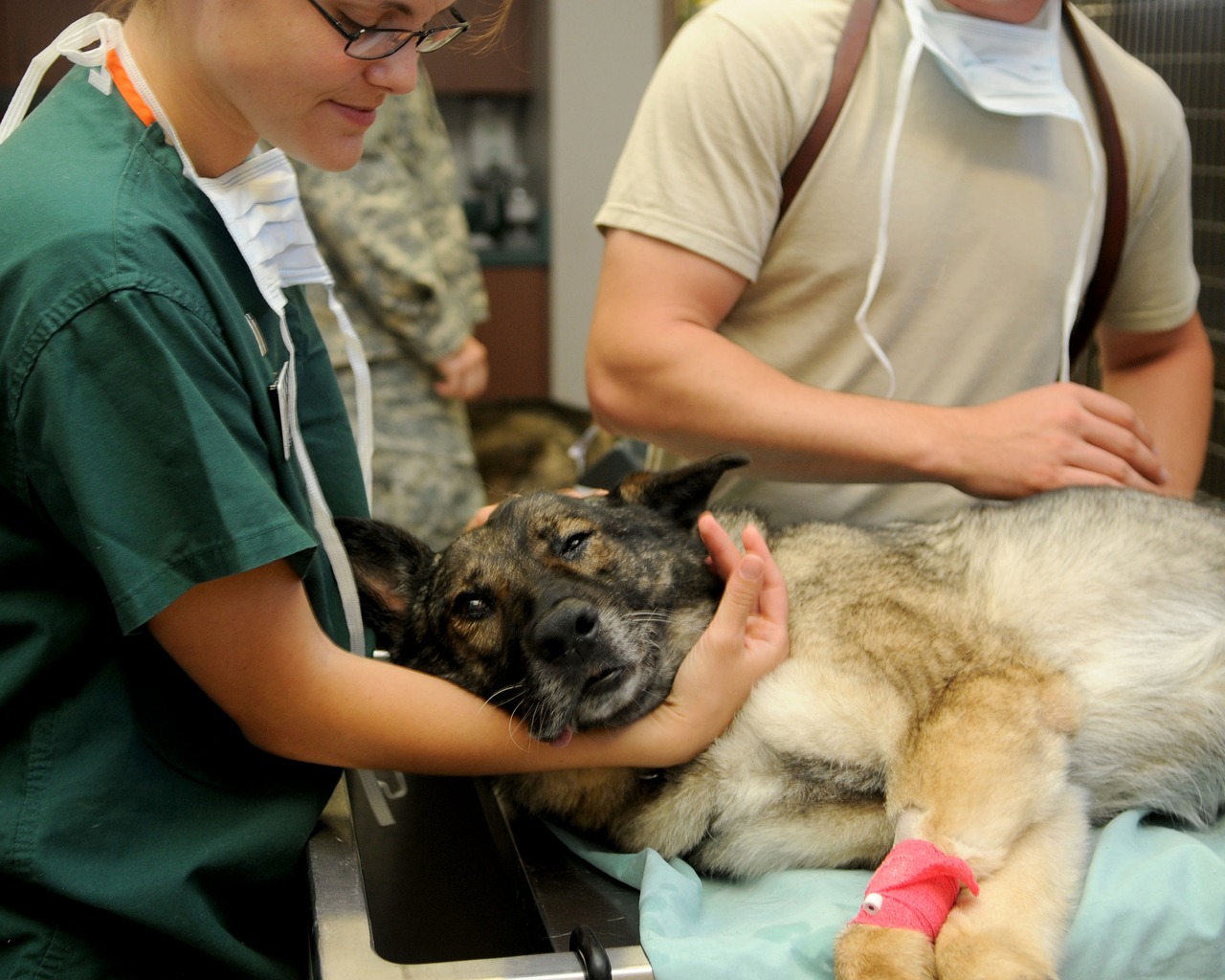
Assessing Qualifications and Experience
When it comes to your furry friend’s health, choosing the right veterinarian is akin to picking a trusted family doctor—you want someone who not only has the right credentials but also the experience to back them up. Understanding a veterinarian's qualifications and experience is crucial for ensuring your pet receives the best care possible. So, what should you be looking for? First, check for their educational background. Most veterinarians hold a Doctor of Veterinary Medicine (DVM) degree from an accredited veterinary college. This is the starting point, but it’s just the tip of the iceberg.
Next, consider any specializations. Just like in human medicine, some vets focus on specific areas such as surgery, dermatology, or internal medicine. If your pet has a particular health issue, finding a vet with specialized training can make a world of difference. For instance, a vet with a focus on oncology would be invaluable if your pet is facing cancer treatment. Don’t hesitate to ask about their years of practice as well; experience often translates to better judgment and skill. A veterinarian with several years under their belt has likely seen a wide range of cases and can draw upon that experience when treating your pet.
In addition to formal qualifications, look for any additional certifications or memberships in professional organizations. Being part of groups like the American Veterinary Medical Association (AVMA) or the American Animal Hospital Association (AAHA) often indicates a commitment to staying updated on the latest practices and technologies in veterinary medicine. Here's a quick overview of what to consider:
| Criteria | What to Look For |
|---|---|
| Education | DVM degree from an accredited institution |
| Specializations | Board-certified in specific fields (e.g., surgery, dentistry) |
| Experience | Years in practice and variety of cases handled |
| Certifications | Membership in professional associations |
Also, don’t underestimate the importance of personal recommendations. Ask friends, family, or even local pet groups for their experiences with different veterinarians. A glowing recommendation can often give you the confidence you need to make a decision. Remember, your veterinarian will be your partner in keeping your pet healthy, so it’s essential to choose someone whose qualifications and experience align with your expectations.
Lastly, during your initial visit, observe how the veterinarian interacts with your pet. A skilled vet will not only be knowledgeable but also gentle and compassionate. This can be just as important as their formal qualifications. After all, a vet who can put your pet at ease will make visits much less stressful for both of you!
- What qualifications should I look for in a veterinarian? Look for a DVM degree, specializations, and memberships in professional organizations.
- How can I find out about a vet's experience? Ask about their years in practice and the types of cases they have handled.
- Why is specialization important? Specializations can provide your pet with targeted care for specific health issues.
- What role do personal recommendations play? They can provide insight into a vet's skills and bedside manner.
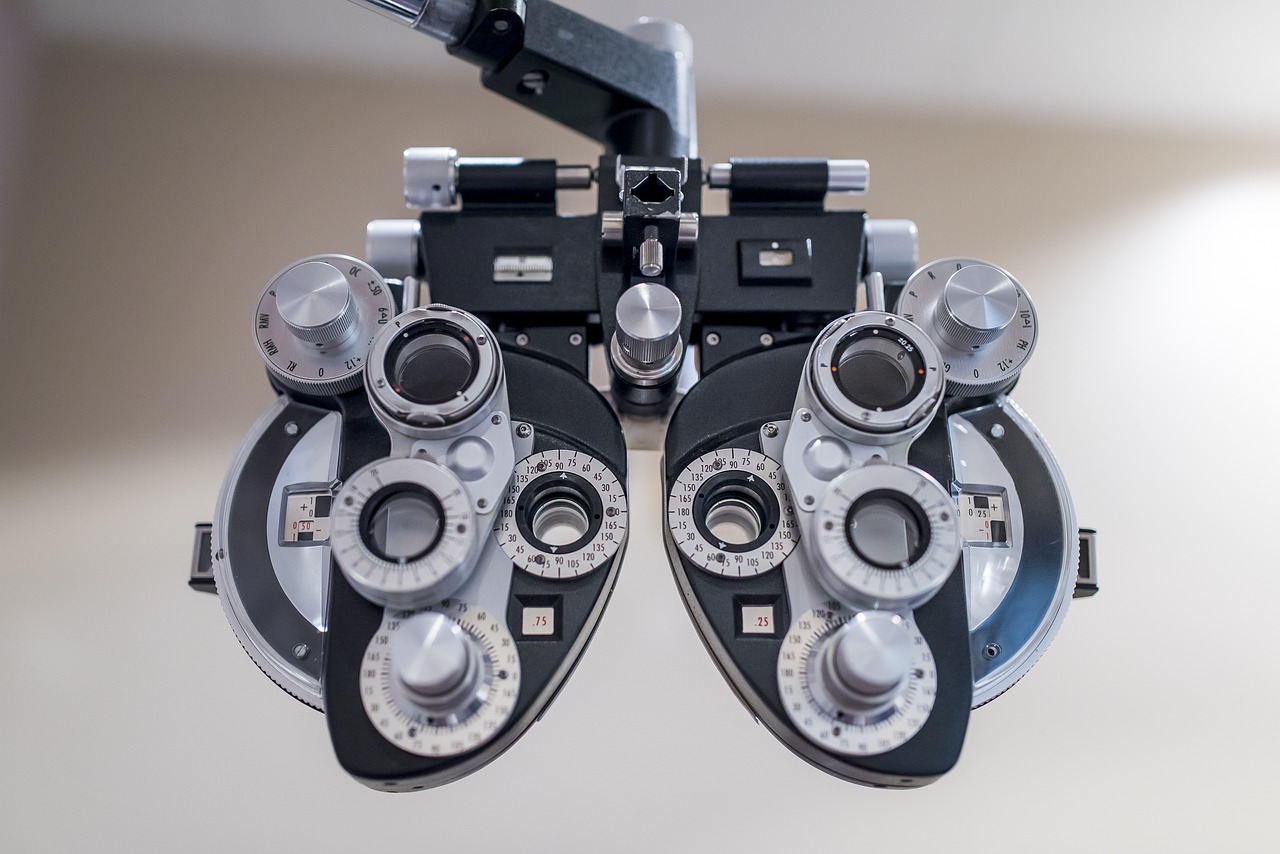
Evaluating Clinic Facilities
When it comes to your pet's health, the environment where they receive care plays a crucial role. Imagine walking into a clinic that feels clean, organized, and welcoming; it immediately puts you at ease, doesn't it? That’s the kind of atmosphere you should seek when evaluating veterinary clinics. Start by observing the overall cleanliness of the facility. A tidy space not only reflects the clinic's professionalism but also indicates that they prioritize the health and safety of their patients. Look around for signs of proper sanitation, such as clean floors, disinfected equipment, and well-maintained waiting areas.
Next, consider the equipment available at the clinic. Modern veterinary practices often utilize advanced technology to diagnose and treat pets effectively. For instance, clinics equipped with digital X-ray machines, ultrasound devices, and in-house laboratory services can provide quicker and more accurate diagnoses. It’s worth asking the veterinarian about the types of equipment they use and how often they upgrade their tools and technology.
Another important aspect to evaluate is the range of services offered by the clinic. Not all veterinary practices are created equal, and some may specialize in certain areas, such as surgery, dentistry, or even behavioral therapy. When you visit, inquire about the services they provide and whether they offer anything beyond routine check-ups, such as:
- Dental cleanings
- Emergency care
- Boarding services
- Grooming
This way, you can gauge whether the clinic can meet your pet's needs now and in the future.
Lastly, don’t forget to check the waiting area. A well-organized and comfortable space can make a significant difference in your pet's experience. Are there separate waiting areas for cats and dogs? Is there enough space for pets to feel safe and not overcrowded? These factors can help reduce stress for both you and your furry friend. Remember, a positive environment can lead to a more enjoyable visit, which is essential for building a trusting relationship with your veterinarian.
Q: What should I look for in a veterinary clinic?
A: Look for cleanliness, modern equipment, a range of services, and a comfortable waiting area. These factors can significantly impact your pet's experience.
Q: How can I assess the quality of equipment at a clinic?
A: Ask the veterinarian about the types of equipment they use and how often they are updated. You can also look for signs of modern technology during your visit.
Q: Why is a clean environment important for my pet?
A: A clean environment helps prevent the spread of infections and ensures that your pet receives care in a safe and hygienic setting.
Emergency Care Options
When it comes to your furry friend's health, being prepared for emergencies is crucial. Just like you wouldn't want to be caught off guard during a medical crisis, your pet deserves the same level of preparedness. This is why it's essential to know if the veterinary clinic you're considering offers emergency care options or has established partnerships with nearby facilities. Think of it as having a safety net in place; you never know when your pet might need immediate attention, and being proactive can make all the difference.
As you explore potential clinics, don’t hesitate to ask specific questions about their emergency services. Here are some key points to consider:
- 24/7 Availability: Does the clinic provide round-the-clock emergency services, or do they refer after-hours cases to another facility?
- Emergency Protocols: What procedures does the clinic have in place for urgent situations? Understanding their approach can give you peace of mind.
- Location of Emergency Facilities: If the clinic does not handle emergencies directly, where will they send your pet? Proximity can be a lifesaver.
In addition to knowing about emergency services, it's also wise to inquire about the clinic's after-hours care options. Emergencies don't follow a 9-to-5 schedule, and your veterinarian should be prepared for that reality. Understanding how they handle after-hours situations can ease your worries. For instance, do they have an on-call veterinarian, or do they recommend a specific emergency clinic? Having this information at your fingertips can save precious time when every second counts.
Lastly, a reputable veterinarian should have a robust referral network for specialized care. If your pet requires advanced treatment, it's reassuring to know that your veterinarian can connect you with trusted specialists. This network can be invaluable, ensuring that your pet gets the best possible care when it matters most. After all, you want to feel confident that your veterinarian is not only capable but also connected in the wider veterinary community.
- What should I do if my pet has an emergency after hours? Always have the contact information for your veterinarian's emergency line or the nearest emergency clinic handy.
- How can I prepare for a pet emergency? Familiarize yourself with your vet's emergency protocols and keep a pet first-aid kit at home.
- Is it necessary to have pet insurance for emergencies? While not mandatory, pet insurance can significantly alleviate the financial burden of unexpected emergencies.
After-Hours Services
When it comes to your beloved pet's health, emergencies don't follow a 9-to-5 schedule. That's why it's crucial to choose a veterinary clinic that offers . Imagine this: it's late at night, and your furry friend has suddenly fallen ill. Wouldn't you want to know that help is just a phone call away? A clinic that provides after-hours care can be a lifesaver, ensuring that your pet receives prompt attention when it matters most.
Inquire about the clinic's protocols for after-hours assistance. Some veterinary clinics have dedicated emergency teams available around the clock, while others might refer you to a nearby emergency veterinary hospital. It's essential to understand how the clinic handles after-hours situations, including:
- Whether they have a dedicated emergency line.
- If they can provide immediate care or if they refer to another facility.
- The average response time for after-hours calls.
Additionally, knowing the location of any partnered emergency clinics can save precious time in a crisis. Ask your veterinarian to provide you with a list of nearby emergency facilities, including their contact information and hours of operation. This way, you'll be prepared and informed should an emergency arise.
Furthermore, consider visiting the clinic during regular hours to get a feel for the staff and the facility. This visit can help you gauge how they handle after-hours situations based on their general demeanor and professionalism. A clinic that prioritizes communication and transparency will likely extend those values into their after-hours care.
In conclusion, having a reliable after-hours service can provide you with peace of mind, knowing that your pet's health is in good hands, no matter the hour. Don't hesitate to ask questions and gather information to ensure you're making the best choice for your furry family member.
- What should I do if my pet has an emergency after hours? Contact your veterinarian's after-hours line or head to the nearest emergency veterinary clinic.
- How can I find out if my vet offers after-hours services? Call the clinic directly or check their website for information regarding after-hours care.
- Are after-hours services more expensive? Yes, emergency services can often come with additional fees, so it's important to be aware of the costs involved.
- What types of emergencies warrant after-hours care? Any sudden illness, injury, or distress in your pet should be treated as an emergency and requires immediate attention.
Referral Networks
When it comes to your pet's health, having a veterinarian with a solid referral network is like having a trusted guide in a vast, uncharted wilderness. You want someone who not only knows the lay of the land but also has connections to specialists who can provide advanced care when your furry friend needs it most. A robust referral network ensures that if your pet requires specialized treatment—be it for surgery, dermatology, or even behavioral issues—you won't be left scrambling for options.
It's essential to ask potential veterinarians about their referral practices. A good vet will not only have established relationships with specialists but will also be able to explain the process clearly. They should be able to provide you with a list of trusted specialists in various fields, making it easier for you to access top-notch care without the stress of searching for a qualified professional on your own. Here are some key points to consider when evaluating a veterinarian's referral network:
- Established Connections: Does the veterinarian have a list of specialists they frequently work with? This indicates a strong professional network.
- Communication: How well does the veterinarian communicate with specialists? A seamless communication process can significantly improve your pet's care.
- Follow-Up Care: Will your vet be involved in your pet's treatment after a referral? A good vet should coordinate with the specialist to ensure continuity of care.
Moreover, don't hesitate to ask about the types of specialists they refer to. Whether it's a veterinary oncologist for cancer treatments or a veterinary cardiologist for heart issues, knowing that your veterinarian has reliable contacts can provide immense peace of mind. You might even want to ask other pet owners in your community about their experiences with specific specialists, as personal recommendations can often lead to better outcomes.
In summary, a veterinarian with a strong referral network is invaluable. They not only enhance the level of care your pet receives but also ensure that you are supported throughout the process. After all, when it comes to your beloved pet's health, you want to make sure every possible avenue for quality care is open and accessible. So, as you embark on your journey to find the right veterinarian, remember that a well-connected vet is a key ally in your pet’s health adventure.
Q1: Why is a referral network important for my veterinarian?
A referral network is crucial because it allows your veterinarian to connect your pet with specialists when advanced care is needed. This ensures that your pet receives the best possible treatment without delay.
Q2: How can I find out about a veterinarian's referral network?
You can ask the veterinarian directly during your initial consultation about their referral practices and the specialists they work with. It's also helpful to read reviews from other pet owners.
Q3: Will my veterinarian stay involved after a referral?
A good veterinarian will coordinate with the specialist and remain involved in your pet's care to ensure continuity and follow-up treatment as needed.
Q4: Can I choose my own specialist if I have a preference?
Yes, you can discuss your preferences with your veterinarian, who may be able to accommodate your choice or provide guidance based on their network.
Communication Style
When it comes to your pet's health, the of your veterinarian can make all the difference. Imagine walking into a clinic where the staff is friendly, and the vet takes the time to genuinely listen to your concerns. It’s like having a trusted friend who not only understands your worries but also knows how to address them effectively. You want someone who can break down complex medical jargon into simple, understandable terms. After all, your pet's health decisions are too important to be left in the dark!
A good veterinarian will not only explain treatment options clearly but will also encourage you to ask questions. Think of this as a two-way street; the more open the communication, the better the relationship you’ll build. You should feel comfortable discussing your pet’s symptoms, lifestyle, and any behavioral changes. If your vet seems rushed or dismissive, it might be a sign to keep looking. Remember, you’re not just a client; you’re a partner in your pet’s health journey.
Here are some key aspects to consider when evaluating a veterinarian's communication style:
- Listening Skills: Does the veterinarian actively listen to your concerns and ask follow-up questions? This shows they value your input.
- Clarity: Are they able to explain medical terms and procedures in a way that makes sense to you? A good vet should be able to simplify complex information.
- Empathy: Do they show understanding and compassion towards your pet's situation? A caring vet will acknowledge your feelings and provide reassurance.
- Availability: How accessible are they for follow-up questions? Good communication doesn’t stop at the appointment; it should continue as needed.
Ultimately, the right veterinarian will make you feel comfortable and informed. They should inspire confidence in their recommendations and support your decision-making process. Think of it like choosing a coach for a sports team; you want someone who motivates you, listens to your strategies, and helps you improve your game. In this case, the game is your pet's health!
Here are some common questions pet owners have when selecting a veterinarian:
- What should I look for in a veterinarian? Look for qualifications, experience, communication style, and a clinic that meets your expectations.
- How important is it to have a vet who listens? Extremely important! Effective communication ensures that you and your vet can work together for your pet's well-being.
- Should I visit the clinic before making a decision? Yes! A visit can give you a feel for the environment and help you assess the staff's friendliness and professionalism.
- What if I don’t agree with the vet’s recommendations? It’s essential to discuss your concerns openly. A good vet will respect your perspective and work with you to find the best solution.
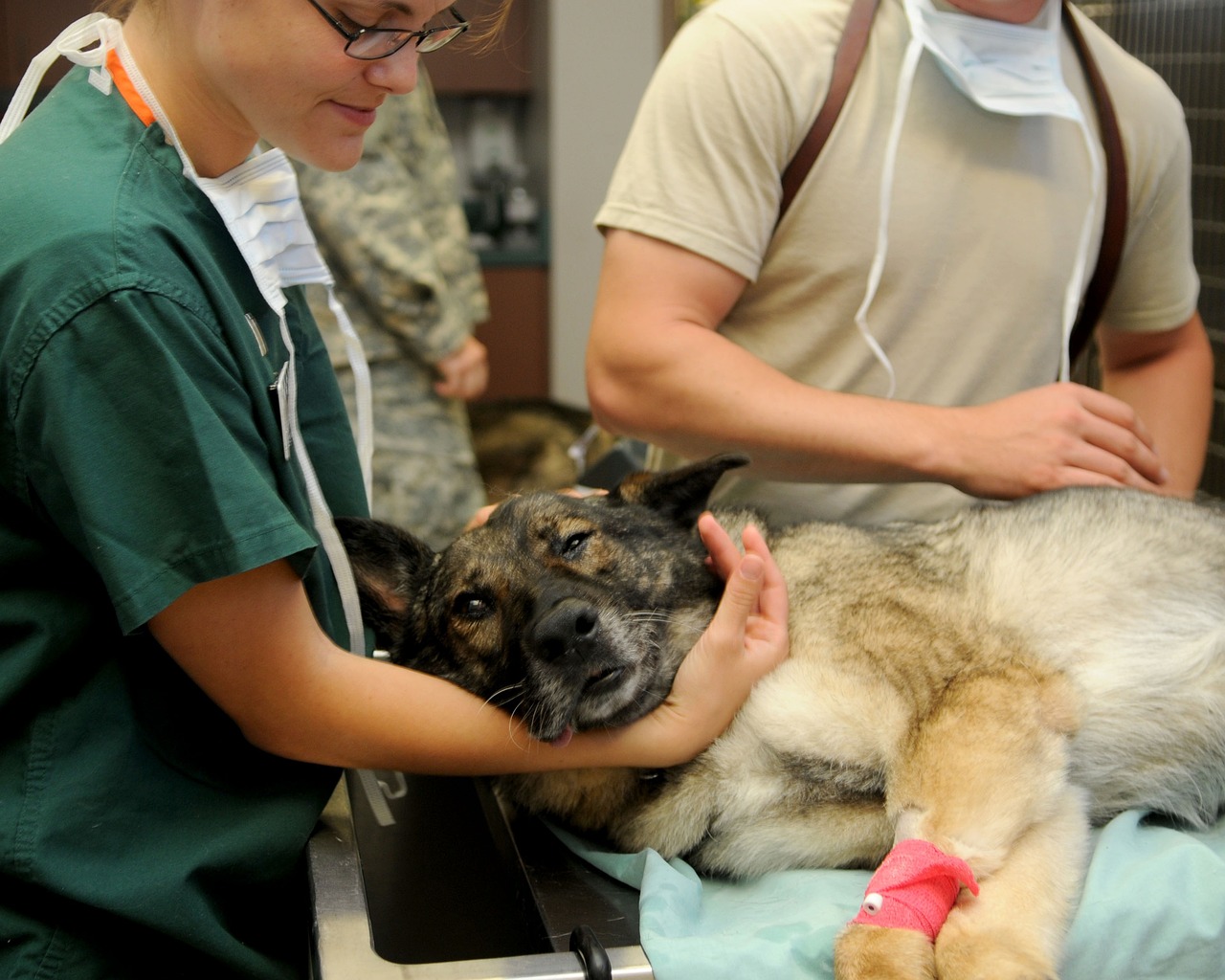
Understanding Treatment Philosophy
When it comes to choosing a veterinarian, understanding their treatment philosophy is paramount. Just like people have different approaches to health and wellness, veterinarians also have unique methods and beliefs about how to best care for animals. This can significantly affect your pet's health and well-being, so it's essential to align your values with those of your chosen vet.
One of the first things to consider is whether the veterinarian emphasizes preventive care. A vet who prioritizes preventive measures can help keep your pet healthy and potentially save you from costly treatments down the line. This approach often includes regular wellness exams, vaccinations, and discussions about nutrition. For instance, a vet might recommend a specific diet based on your pet's age, breed, and health status. By focusing on preventive care, they aim to catch any potential health issues before they become serious.
On the other hand, some veterinarians may lean towards a more reactive treatment philosophy, where they focus on treating ailments as they arise. While this can be effective in certain situations, it may not always be the best approach for long-term health. You want a vet who is proactive, not just reactive. Ask questions about how they handle routine care and what their stance is on vaccinations and regular check-ups.
Additionally, if you're interested in exploring alternative treatment options for your pet, it's crucial to discuss this with your veterinarian. Some vets are more open to integrating holistic therapies, such as acupuncture, herbal medicine, or chiropractic care, into their treatment plans. This can be particularly beneficial for pets with chronic conditions or those who may not respond well to conventional treatments.
To help you understand a veterinarian's treatment philosophy better, consider asking the following questions during your initial visit:
- What is your approach to preventive care?
- How do you feel about alternative treatments?
- Can you explain your philosophy on vaccinations?
- How do you handle pain management for pets?
Ultimately, the right veterinarian for you and your pet will be one who not only possesses the necessary qualifications and experience but also shares your views on treatment philosophy. This alignment can lead to a more harmonious relationship and ensure that your pet receives the best possible care. Remember, your veterinarian should be a partner in your pet's health journey, guiding you with expertise and compassion.
Q: How can I determine if a veterinarian's treatment philosophy aligns with my beliefs?
A: The best way is to ask direct questions during your initial consultation. Discuss your expectations regarding preventive care, alternative treatments, and overall health strategies for your pet.
Q: Is preventive care really that important?
A: Yes! Preventive care can help catch health issues early, potentially saving you and your pet from more serious problems in the future.
Q: What should I do if my veterinarian's philosophy does not match mine?
A: If you find that your vet's approach does not align with your beliefs, it may be time to seek out another veterinarian who shares your views on pet care.
Preventive Care Focus
When it comes to keeping your furry friend healthy, a veterinarian who prioritizes preventive care can make all the difference. Think of preventive care as the shield that protects your pet from potential health issues before they even arise. Just like we humans visit the doctor for annual check-ups and vaccinations, our pets need similar attention to ensure they lead long, happy lives. A veterinarian with a strong focus on preventive care will not only provide regular check-ups but will also emphasize the importance of vaccinations, dental care, and proper nutrition.
During your first visit, it’s essential to engage in a conversation about how the veterinarian approaches preventive care. Ask them about their protocols for vaccinations and how they tailor these to your pet's lifestyle and age. For instance, a young, active dog may require different vaccines compared to a senior cat that stays indoors. This personalized approach is crucial because it helps in crafting a health plan that suits your pet's unique needs.
Moreover, nutrition plays a pivotal role in preventive care. A vet who understands the significance of a balanced diet will help you choose the right food tailored to your pet’s specific health requirements. They might discuss the benefits of high-quality ingredients, the importance of maintaining a healthy weight, and how certain diets can prevent common health problems like obesity and diabetes.
Additionally, regular wellness exams are a key component of preventive care. These check-ups are not just about vaccinations; they allow the veterinarian to assess your pet's overall health, catch potential issues early, and provide guidance on maintaining your pet’s health. For example, during an exam, the vet might check your pet’s weight, coat condition, and even perform blood tests to ensure everything is functioning as it should. This proactive approach can save you from unexpected veterinary bills down the line and ensure your pet remains vibrant and active.
In conclusion, having a veterinarian who emphasizes preventive care is like having a trusted ally in your pet's health journey. They will guide you through the maze of vaccinations, nutrition, and regular check-ups, ensuring that your beloved pet stays healthy and happy. After all, wouldn’t you want to do everything possible to keep your furry companion by your side for as long as possible?
- What is preventive care for pets? Preventive care refers to the measures taken to prevent diseases and health issues in pets, including vaccinations, regular check-ups, and proper nutrition.
- How often should my pet see the veterinarian? Generally, pets should have a check-up at least once a year, but older pets or those with health issues may require more frequent visits.
- What vaccinations does my pet need? Vaccination needs vary based on your pet's age, health, and lifestyle. Consult with your veterinarian to create a tailored vaccination schedule.
- How can I maintain my pet's dental health? Regular dental check-ups, proper dental hygiene at home, and specific dental treats can help maintain your pet's dental health.
Alternative Treatment Options
This article provides essential tips for selecting a veterinarian who meets your pet's health needs, ensuring a long-lasting and trusting relationship for optimal care and support.
Understanding a veterinarian's qualifications and experience is crucial for ensuring your pet receives the best care. Look for credentials, specializations, and years of practice to make an informed decision.
The quality of a veterinary clinic's facilities can significantly impact your pet's health. Evaluate cleanliness, equipment, and available services to ensure they meet your expectations for care.
It's essential to know if the clinic offers emergency services or has partnerships with nearby facilities. This ensures your pet receives timely care in urgent situations.
Inquire about after-hours care options, as emergencies can happen at any time. Understanding the clinic's protocol for after-hours assistance can provide peace of mind.
A good veterinarian should have a reliable referral network for specialized care. This ensures that your pet can access advanced treatments when necessary.
Effective communication between you and your veterinarian is vital. Assess how well the veterinarian listens, explains treatment options, and addresses your concerns to ensure a good fit.
Every veterinarian has a unique approach to treatment. Understanding their philosophy on preventive care and alternative treatments can help align with your expectations for your pet's health.
A veterinarian who emphasizes preventive care can help maintain your pet's health over time. Discuss their approach to vaccinations, nutrition, and wellness exams.
If you're exploring for your pet, it's essential to find a veterinarian who is not only knowledgeable but also open to integrating these methods into their practice. Many pet owners are increasingly interested in holistic approaches, which may include therapies such as acupuncture, herbal medicine, and chiropractic care. These methods aim to treat the animal as a whole, addressing not just the symptoms but the underlying causes of health issues.
When you consult with a veterinarian about alternative treatments, consider asking the following questions:
- Experience: What is your experience with alternative therapies?
- Integration: How do you incorporate these treatments alongside conventional medicine?
- Success Stories: Can you share any success stories from other clients?
It's crucial to ensure that any alternative treatment you consider is safe and evidence-based. Some veterinarians may even provide a combination of traditional and alternative therapies, creating a more comprehensive care plan tailored to your pet's specific needs. This integrative approach can be particularly beneficial for chronic conditions or when seeking to improve overall wellness.
Ultimately, the goal is to find a veterinarian who respects your preferences while providing the best possible care for your furry friend. Open communication and a willingness to collaborate on treatment options will help you create a care plan that aligns with your values and your pet's health requirements.
Q: How do I know if my veterinarian is qualified to offer alternative treatments?
A: Look for veterinarians who have specific training or certifications in alternative therapies. You can also ask about their experience and success rates with these treatments.
Q: Are alternative treatments safe for my pet?
A: While many alternative treatments can be beneficial, it's essential to consult with a qualified veterinarian to ensure they are appropriate for your pet's specific health conditions.
Q: Can alternative treatments replace conventional veterinary care?
A: Alternative treatments can complement conventional care but should not replace it without proper guidance from a veterinarian. Always discuss any changes to your pet's treatment plan with your vet.
Frequently Asked Questions
- How do I assess a veterinarian's qualifications?
When looking for a veterinarian, check their educational background, certifications, and years of experience. You can often find this information on the clinic's website or by asking directly during your first visit.
- What should I look for in a veterinary clinic's facilities?
Evaluate the cleanliness and organization of the clinic. Look for modern equipment and a welcoming atmosphere. A well-equipped clinic can provide better care for your pet.
- Are emergency services available at veterinary clinics?
It's crucial to know if your chosen clinic offers emergency services. Ask about their protocols for urgent care and whether they have partnerships with nearby emergency facilities.
- What if my pet needs care after hours?
Inquire about after-hours services. Some clinics have emergency contacts or partnerships with 24-hour facilities. Knowing this can ease your worries in case of an emergency.
- How can I evaluate a veterinarian's communication style?
Pay attention to how the veterinarian interacts with you. Do they listen carefully to your concerns? Are they clear in explaining treatment options? Good communication is key to a successful partnership.
- What is a veterinarian's treatment philosophy?
Understanding a veterinarian's approach to treatment is essential. Some may focus on preventive care, while others might emphasize alternative treatments. Discussing these philosophies can help align your expectations.
- How important is preventive care for my pet?
Preventive care is vital for maintaining your pet's health. A veterinarian who prioritizes vaccinations, nutrition, and regular wellness exams can help prevent health issues before they arise.
- Are alternative treatments available for my pet?
If you're interested in holistic or alternative therapies, ask your veterinarian about their experience with these options. A good vet will be open to discussing how to integrate these treatments into your pet's care plan.






